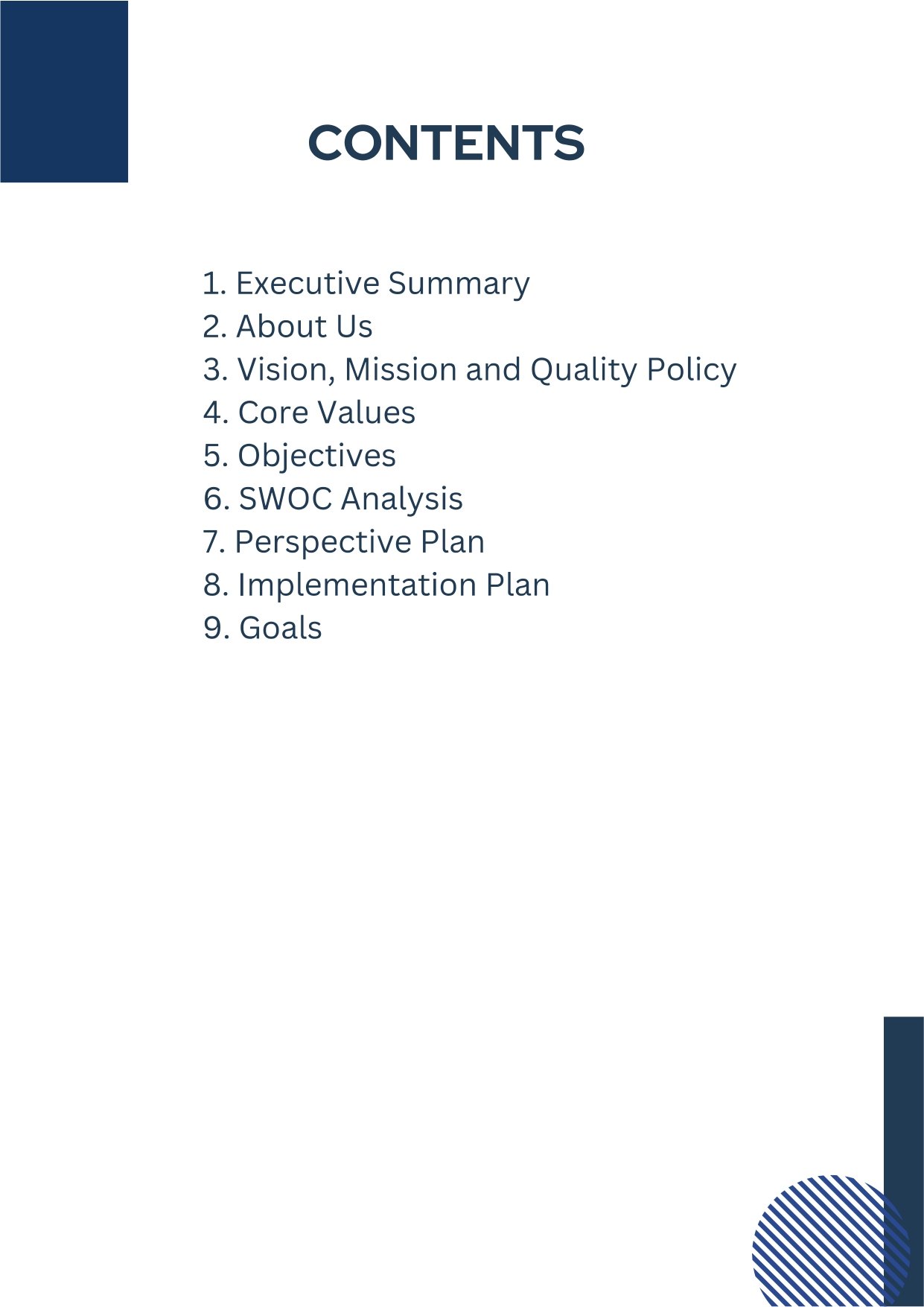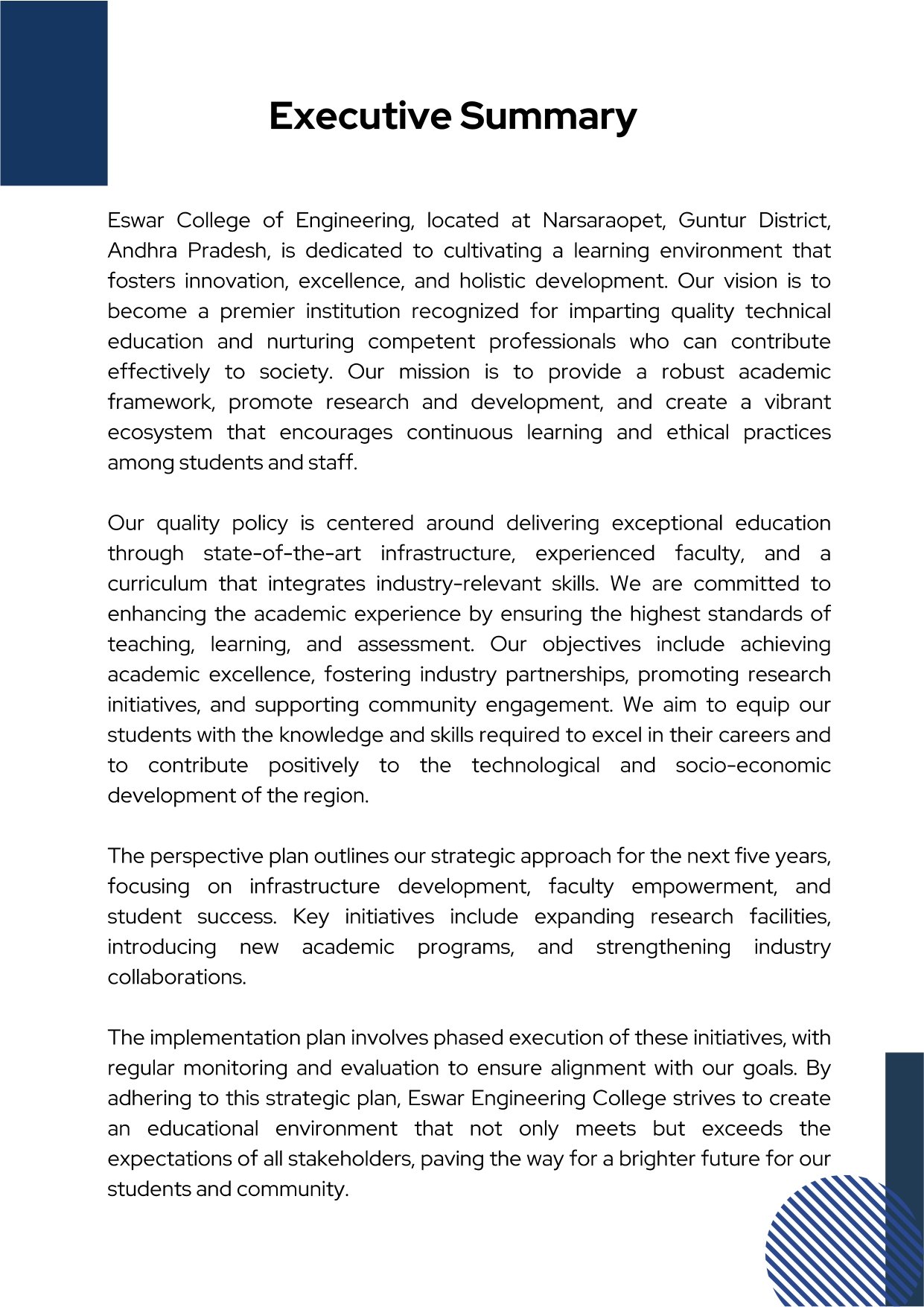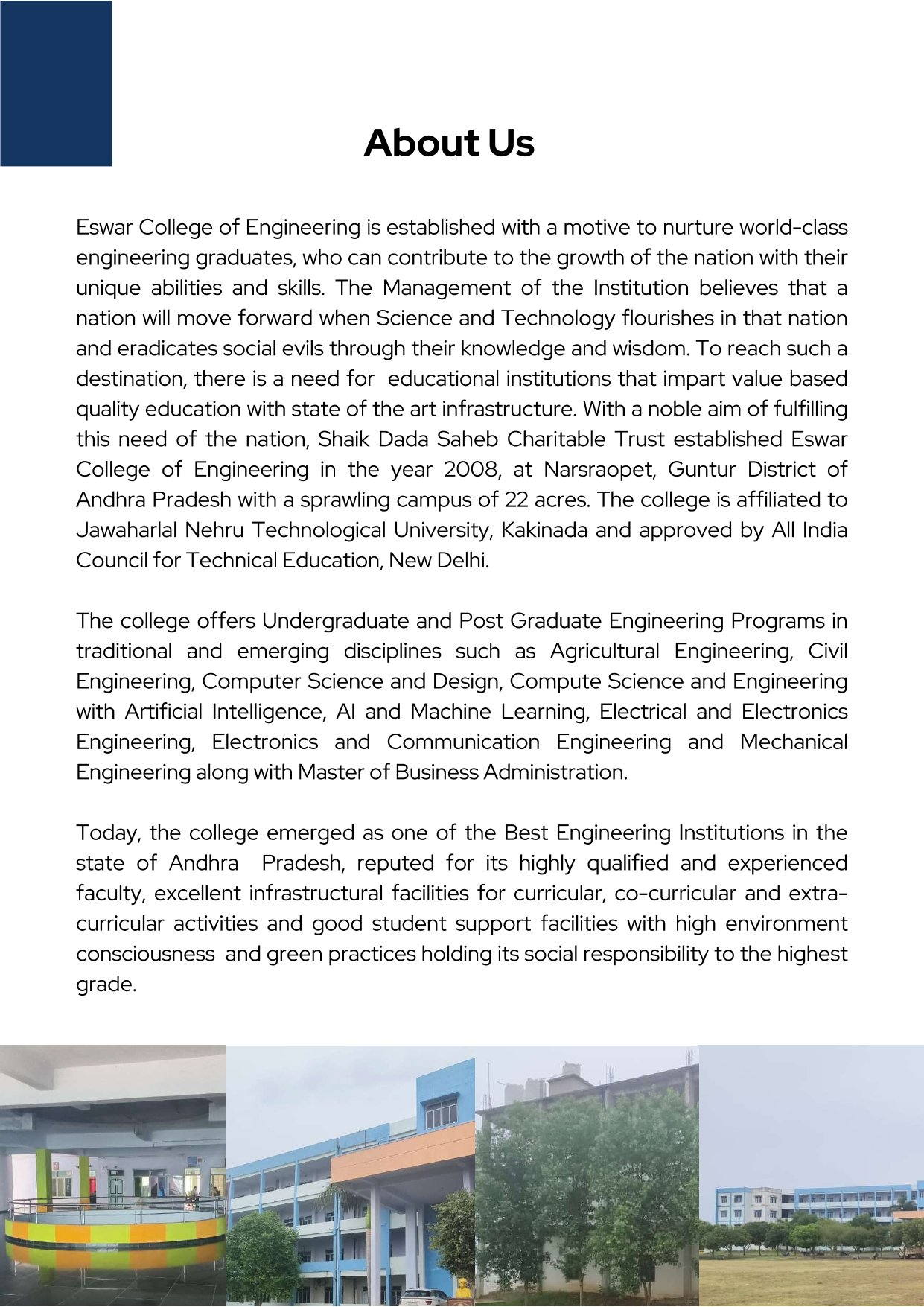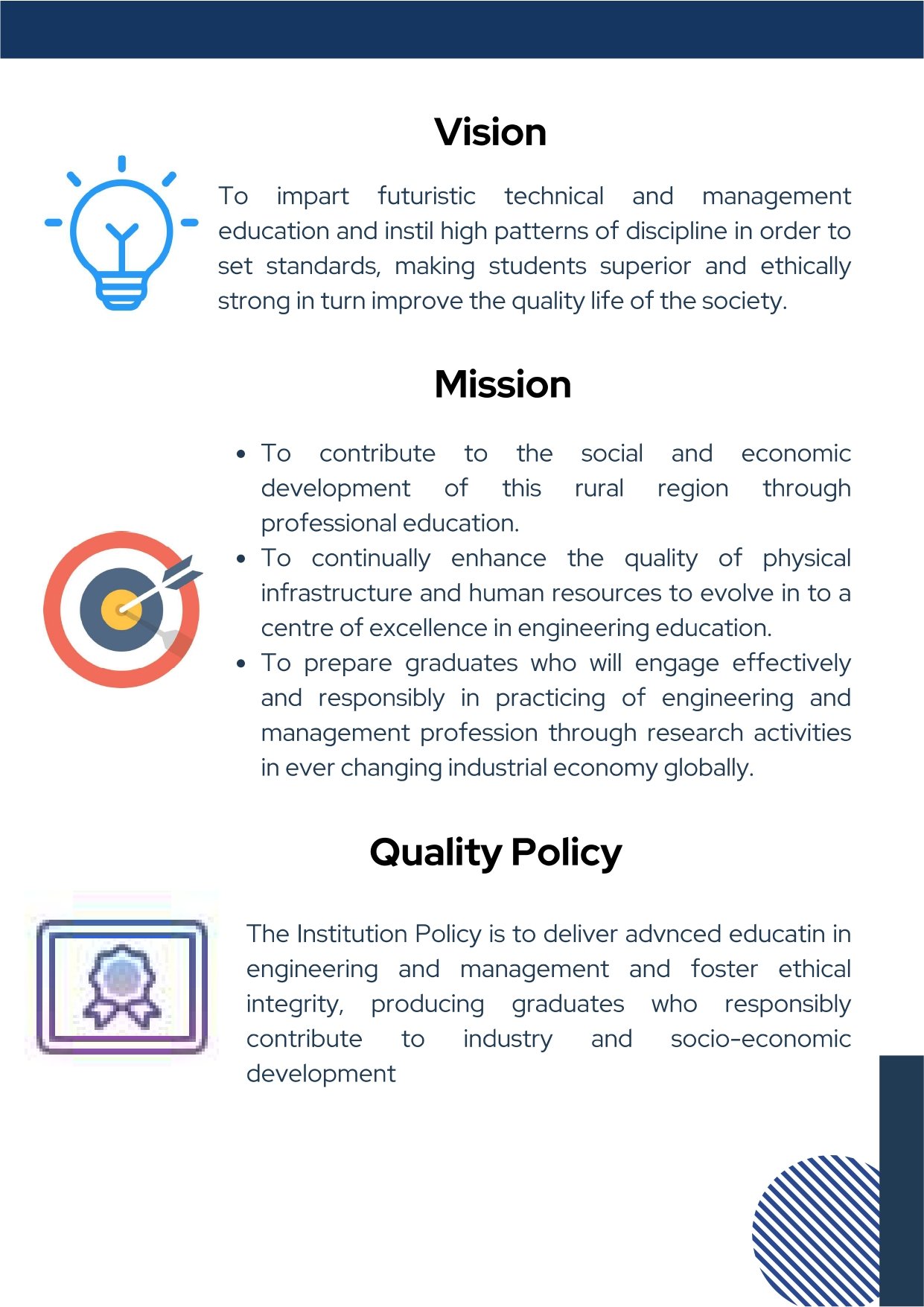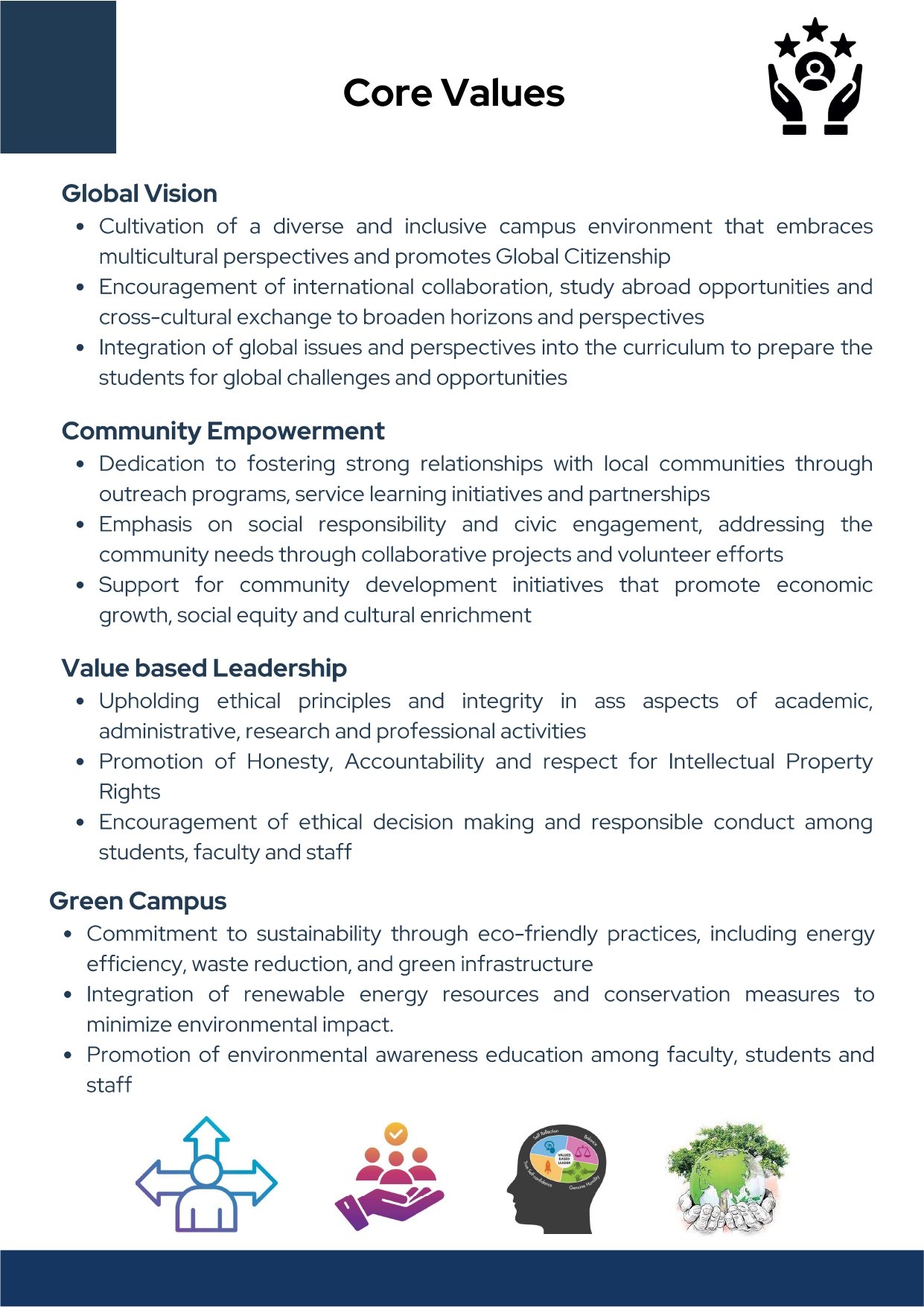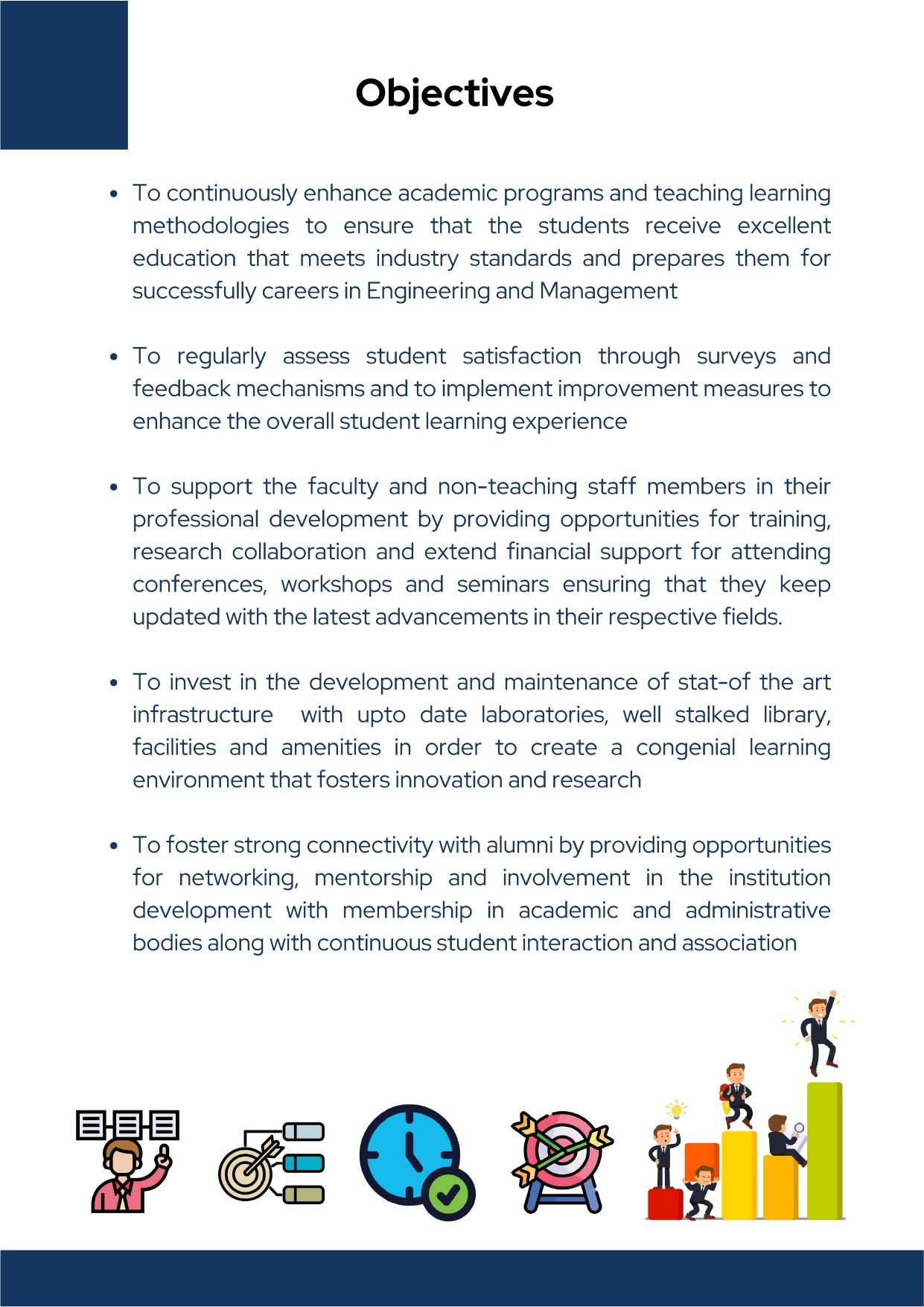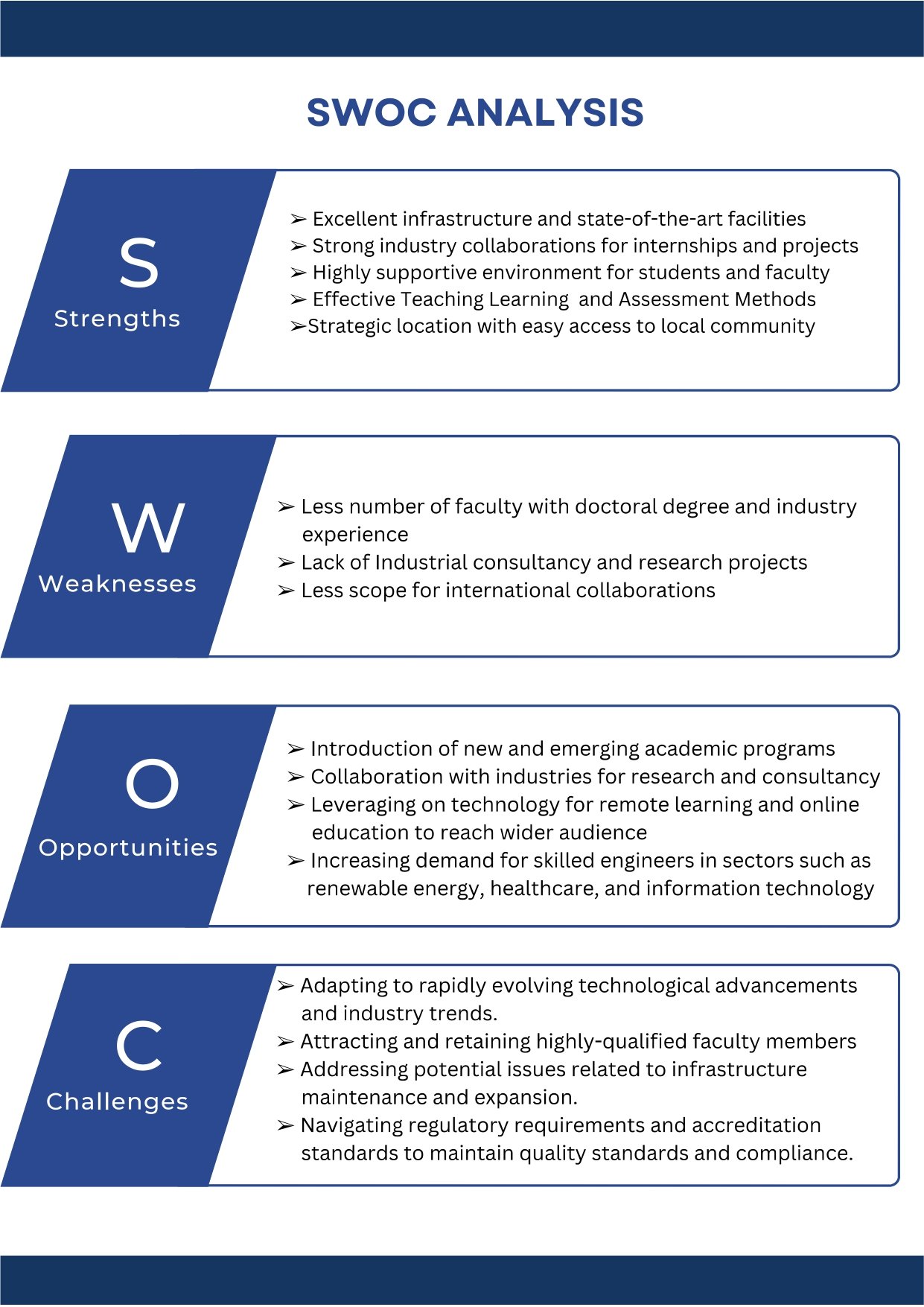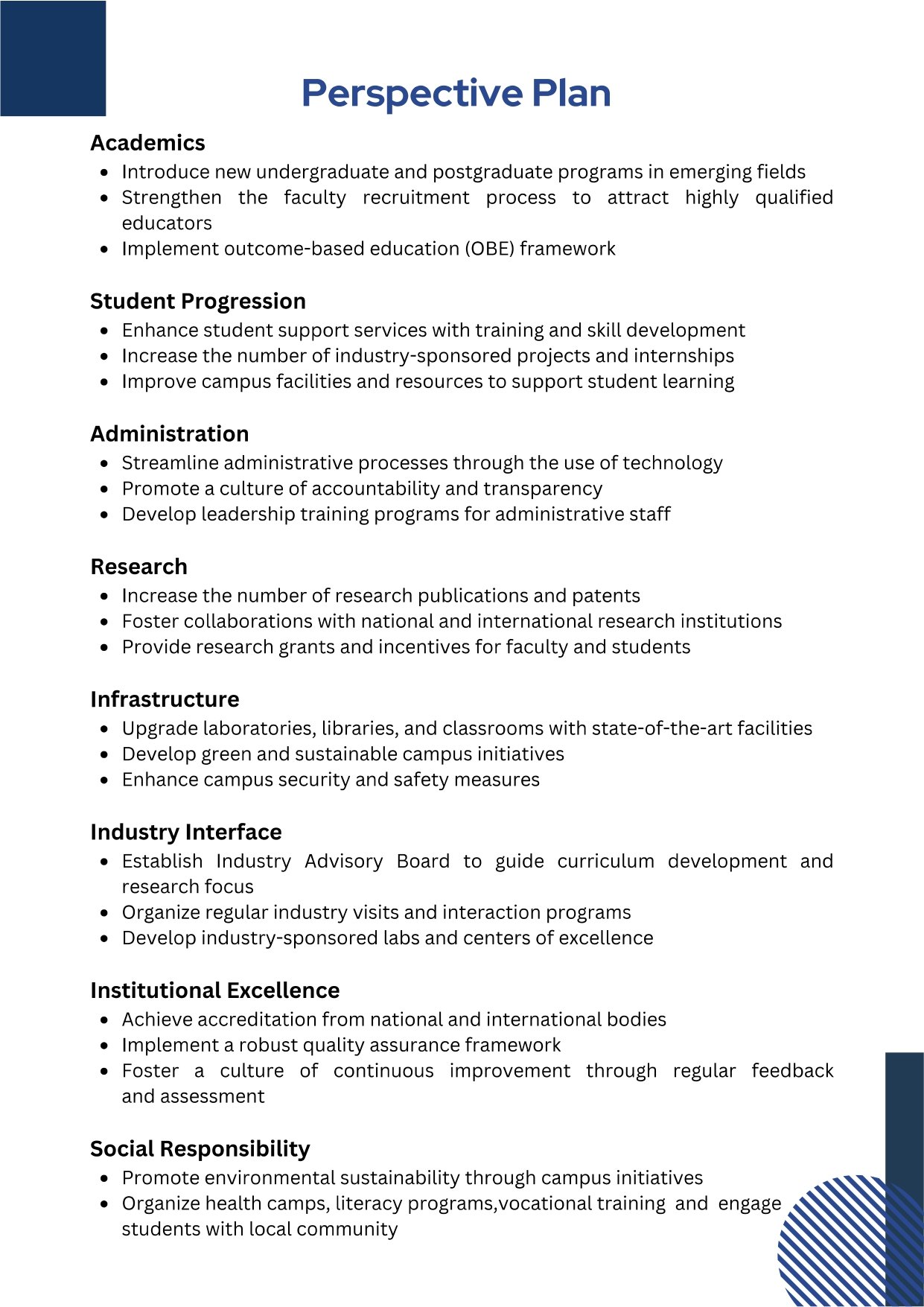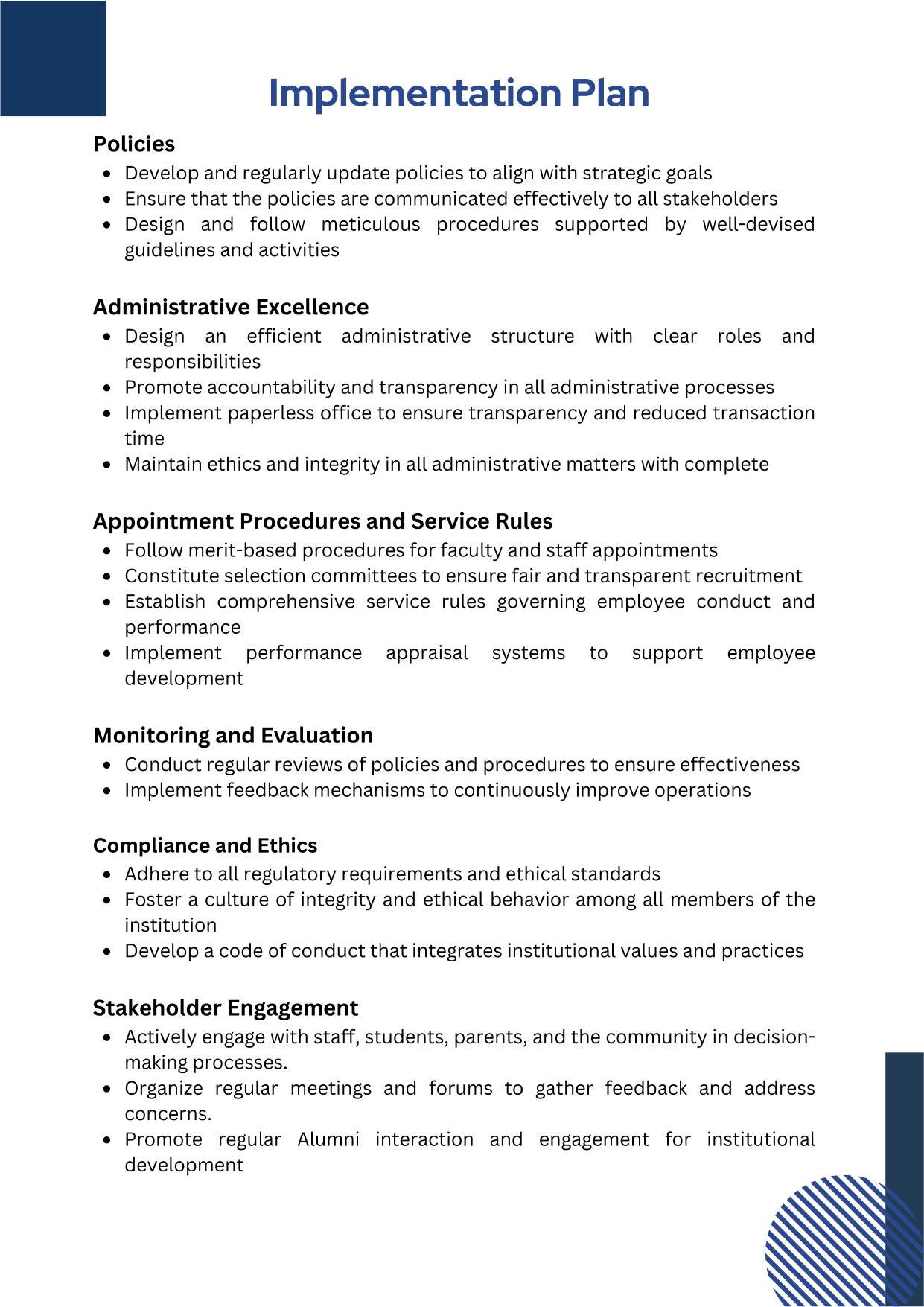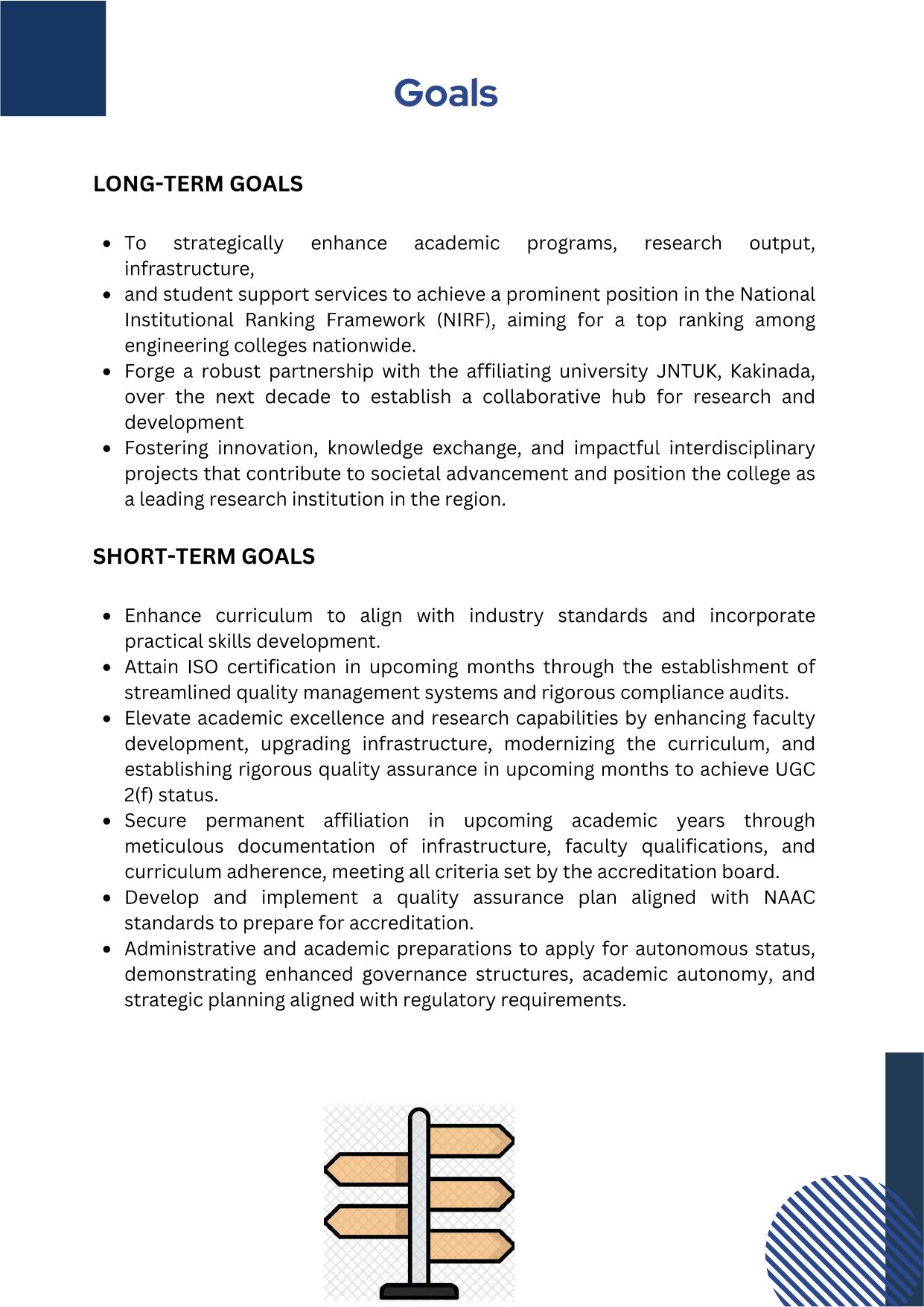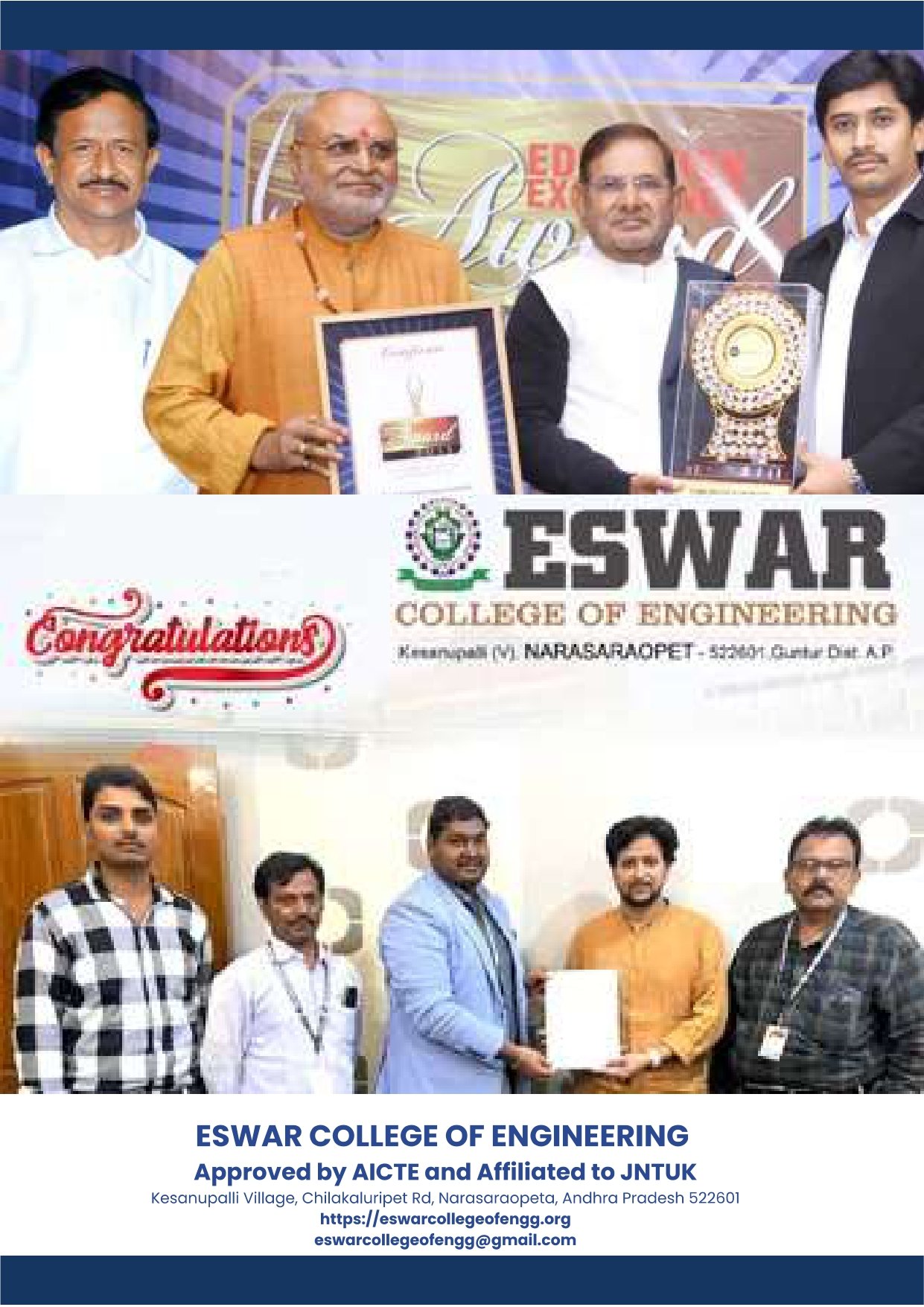About IQAC
IQAC Members
Minutes
Strategic Plan
Feedback from Stakeholders
Best Practices
Institutional Distinctiveness
About IQAC
About IQAC
The Internal Quality Assurance Cell (IQAC), established in September, 2021, is dedicated to enhancing and sustaining educational quality through continuous improvement. It focuses on developing robust systems to ensure excellence in teaching, learning, and institutional performance. IQAC promotes faculty development, innovative teaching methods, and rigorous evaluation procedures.
Vision: To cultivate a continuous improvement culture that ensures excellence in education, fosters innovation, and enhances the overall performance and reputation of the institution.
Mission:
Vision: To cultivate a continuous improvement culture that ensures excellence in education, fosters innovation, and enhances the overall performance and reputation of the institution.
Mission:
- Promote Excellence in Teaching and Learning:
- Implement Effective Quality Assurance Systems
- Enhance Institutional Support and Stakeholder Engagement
- Promote faculty participation in Faculty Development Programs (FDPs) focused on Outcome Based Education.
- Ensure ongoing evaluation of classroom teaching quality by the Principal.
- Encourage faculty to engage in various SWAYAM and MOOC courses.
- Ensure timely and efficient completion of academic tasks.
- Maintain the relevance and quality of academic and research programs.
- Optimize and integrate modern teaching and learning methods.
- Uphold the credibility of evaluation procedures.
- Ensure adequate maintenance and proper allocation of support structures and services.
- Monitor the quality of admissions and placements.
- Track success in higher studies.
- Analyze feedback and results.
- Promote student participation in guest lectures, seminars, and workshops.
- Monitor student profiles and daily attendance.
- Evaluate the success rate of graduates.
- Recognize student awards, achievements, and performance in competitive exams.
- Highlight distinguished alumni profiles.
- Assess faculty quality of research publications.
- Monitor consultancy and research projects.
- Track workshops, seminars, FDPs, conferences organized and attended/participated in.
- Record patents applied for/awarded and books published/reviewed/edited.
- Recognize faculty awards and achievements, and faculty guiding Ph.D. students.
- Count the number of collaborations.
- Evaluate teaching and learning methods and mentoring.
- Ensure timely conclusion of examinations and evaluations.
- Establishing and using quality standards for all college programs.
- Evaluating results and faculty quality for the institution’s academic and administrative tasks.
- Creating a student-focused environment that supports quality education and helps faculty adapt to new teaching methods and technology.
- Gathering and analyzing feedback from all involved parties on quality-related processes.
- Sharing information about various quality standards with everyone involved.
- Hosting workshops and seminars on quality topics and encouraging quality improvement groups.
- Documenting programs and activities aimed at improving quality.
- Serving as the main contact for quality-related activities and promoting the adoption and sharing of best practices.
- Developing and managing an institutional database to improve quality.
- Regularly conducting internal and administrative audits and following up on them.
IQAC Members
| IQAC Members 2021-22 | |||
| Click here to view IQAC Members 2023-24 | |||
| S.NO. | NAME | DESIGNATION | POSITION |
| Chairperson | |||
| 1 | DR. G.NAGA MALLESWARARAO | PRINCIPAL | CHAIRMAN |
| Representative from the Management | |||
| 2 | SRI SHAIK MASTAN SHARIF | DIRECTIOR | MEMBER |
| Senior Administrative officers | |||
| 3 | SHAIK MUNWAR ALI | Exam Section Incharge | Member |
| Representatives from Teachers | |||
| 4 | SRI. T. SAMBASIVARAO | HOD-CE | MEMBER |
| 5 | DR. V. PRAVEEN | HOD – EEE | MEMBER |
| 6 | DR. K. SANJEEVARAO | HOD – ECE | MEMBER |
| 7 | K MUSALALIAH | HOD – MECH | MEMBER |
| 8 | R. RAMBABU | HOD – AME | MEMBER |
| 9 | SRI G. KARUNAKARA BABU | HOD – S&H | MEMBER |
| 10 | DR. SK. MUZEER | HOD – MBA & TPO | MEMBER |
| Nominees from Employers /Industrialists/Stakeholders | |||
| 11 | KAMEPALLI BRAHMA NAIDU | INDUSTRIALIST | MEMBER |
| 12 | A VENKATESWARULU | PARENT | MEMBER |
| Nominee from Local society, Students and Alumni | |||
| 13 | KAPILAVAYI RAJENDRA PRASAD | SAI VAGDEVI EDUCATIONAL SOCIETY, LOCAL EDUCATION ACTIVIST | MEMBER |
| 14 | VV BRAMHA CHARI | ALUMNI-CSE | MEMBER |
| Coordinator of the IQAC | |||
| 15 | DR. S KHASIM | HOD-CSE | COORDINATOR |
| IQAC Members 2023-24 | |||
| S.NO. | NAME | DESIGNATION | POSITION |
| Chairperson | |||
| 1 | DR. G.NAGA MALLESWARARAO | PRINCIPAL | CHAIRMAN |
| Representative from the Management | |||
| 2 | SRI SHAIK MASTAN SHARIF | DIRECTIOR | MEMBER |
| Senior Administrative officers | |||
| 3 | SHAIK MUNWAR ALI | Exam Section Incharge | Member |
| Representatives from Teachers | |||
| 4 | SRI. SK AKHIL AHAMAD | HOD-CE | MEMBER |
| 5 | DR. V. PRAVEEN | HOD – EEE | MEMBER |
| 6 | V MADHAVI | HOD – CSE | MEMBER |
| 7 | K MUSALALIAH | HOD – MECH | MEMBER |
| 8 | P.VASANTHI | HOD-DET | MEMBER |
| 9 | R. RAMBABU | HOD – AME | MEMBER |
| 10 | SRI G. KARUNAKARA BABU | HOD – S&H | MEMBER |
| 11 | DR. SK. MUZEER | HOD – MBA & TPO | MEMBER |
| Nominees from Employers /Industrialists/Stakeholders | |||
| 12 | KAMEPALLI BRAHMA NAIDU | INDUSTRIALIST | MEMBER |
| 13 | G.NARASIMHA RAO | PARENT | MEMBER |
| Nominee from Local society, Students and Alumni | |||
| 14 | KAPILAVAYI RAJENDRA PRASAD | SAI VAGDEVI EDUCATIONAL SOCIETY, LOCAL EDUCATION ACTIVIST | MEMBER |
| 14 | VV BRAMHA CHARI | ALUMNI-CSE | MEMBER |
| 16 | SHAIK MEERA JASMIN | STUDENT (2022 Batch) | |
| Coordinator of the IQAC | |||
| 15 | DR.SHAIK BASHEERA | HOD-ECE | COORDINATOR |
| Back to Top | |||
Minutes
Strategic Plan
Feedback from Stakeholders
Feedback Forms
Feedback Analysis
| 2022 – 2023 | 2021 – 2022 | 2020 – 2021 | 2019 – 2020 | 2018 – 2019 |
Action Taken
| 2022 – 2023 | 2021 – 2022 | 2020 – 2021 | 2019 – 2020 | 2018 – 2019 |
Best Practices
| Best Practices I | Best Practices II | |
|
Best Practice-I: Title: Four-Fold Methodology of Student Training Introduction The Four-Fold Methodology of Student Training transforms students to tackle industry and societal challenges through pre-placement training. It includes aptitude training, group discussions, technical and HR interviews by professionals, mock interviews with alumni, and career counseling from senior corporate trainees. This approach bridges the gap between industry demands and academic preparation, focusing on personality development, technical skills, and confidence to ensure students are workforce-ready. Objectives To develop and transform students to meet the challenges of industry and society through pre-placement training. To prepare students to face campus interviews by arranging training in aptitude, group discussions, technical, and HR interviews by professional trainers. To make students industry-ready by organizing mock interview sessions with alumni. To encourage career counseling by organizing guest lectures by senior corporate trainees. The Context The industry seeks vibrant, energetic students with strong communication skills. The Training & Placement (T&P) cell bridges the gap between industry demands and academic preparation by organizing training programs that enhance personality development and interview skills. This includes building confidence, creativity, stress management, and professional presentation. The Practice Students are constantly motivated through counseling on the importance of maintaining a good academic record, which plays a major role during recruitment. The institute develops students through training modules designed to impart technical, logical, analytical, behavioral, and managerial skills. They are also assessed through various tests to channelize them towards the right profile. Training programs are conducted for students across all years to enhance different skills, resulting in increased employability opportunities. The training is structured as follows: I Year Students: Communication skills II Year Students: Arithmetic and reasoning III Year Students: Domain-specific knowledge IV Year Students: Soft-skills training 1. Training Programs: T&P cell organizes various training programs for students. o Soft Skill Training: Develops communication, teamwork, confidence, and presentation capabilities in academic and professional settings. o Aptitude Skill Training: Enhances reasoning, data interpretation, logical, and analytical abilities. o Technical Skill Training: Students are trained in advanced languages like C/C++, Java, Python, and recent technologies in core fields. 2. Motivational Lectures: T&P cell organizes various motivational lectures to inspire students and build confidence to achieve their goals. 3. Mock Interviews: T&P cell organizes mock interviews with alumni and industry experts to build student confidence and allow them to reflect on their communication abilities. 4. Placement Statistics: The placement statistics show continuous improvement in the number of students placed in various organizations. Evidence of Success The structured training programs and initiatives by the T&P cell have significantly improved student employability. The continuous improvement in placement statistics reflects the effectiveness of these programs. Students across all years benefit from targeted training that enhances their communication, reasoning, domain-specific knowledge, and soft skills. Problems Encountered and Resources Required University Guidelines: Students are required to follow the guidelines of the affiliating university, which prioritizes examinations. This can lead to a lack of interest in pursuing online and other enrichment courses. Time Constraints: Balancing regular academic work, co-curricular, and placement activities is challenging for students. Subject Experts: Finding experts for enrichment programs based on recent technologies is difficult. To address these challenges, respective departments have taken initiatives to organize and conduct these programs, ensuring students receive comprehensive training despite the limitations.
Best Practice-II: Title: Collaborative and Participative Management Introduction Collaborative and Participative Management at ESWAR College of Engineering involves faculty in institutional activities like examinations, purchases, and infrastructural development. This fosters a sense of belongingness, enhances coordinated efforts, and builds strong team spirit, ensuring comprehensive and inclusive management for the college’s success. Objectives Enhance Faculty Engagement: Foster a sense of belongingness among faculty by involving them in planning, organizing, and implementing activities related to institutional requirements. Promote Collaborative Management: Encourage a participative management approach where faculty actively contribute to the conduct of examinations, purchases, civil and infrastructural development, and other institutional activities. Improve Institutional Efficiency: Achieve better coordination and integration of institutional activities by involving faculty in various administrative roles and committees. The Context For the success of any organization, it is imperative that all employees feel a sense of belongingness and take responsibility for the effective functioning of the organization. Typically, employees are given a set of responsibilities and expected to execute them to some degree of conformance. However, they generally do not have much say in integrating these responsibilities into the organization’s development. Organizations that motivate their staff to take responsibility for the overall functioning can deliver quality output through coordinated efforts, not just individual excellence. The Practice At ESWAR College of Engineering, faculty are integrated into various administrative committees, each led by a senior member. This approach ensures that faculty contribute to the institution’s success and address diverse needs, including examinations, finance, training, and infrastructure, fostering a sense of collective responsibility. Faculty are grouped into various committees, each headed by a senior faculty member who serves as convenor/Member Secretary. Major committees include: Examination Committee Finance Committee Training and Placement Cell Alumni Committee Library Committee R&D Cell Maintenance Committee Disciplinary Committee Members of these committees are drawn from each department, with the principal serving exofficio as chairman of all committees. These committees meet regularly to plan, coordinate, and implement developmental activities. The challenge is to bring all faculty onto a common platform to appreciate the institution’s vision and enhance its performance. Evidence of Success Decisions related to a given domain are discussed in detail, and resolutions are arrived at by the committee for final approval by the central administrative team. For instance, major financial investments like purchasing laboratory equipment are handled entirely by the Finance Committee, which calls for budget proposals from departments and finalizes the allocations. Problems Encountered and Resources Required Challenge of Engagement: Bringing all faculty members, from newly recruited to senior-most, to equally appreciate and effectively contribute to tasks Orientation Investment: Significant time spent on orienting faculty to understand and appreciate institutional challenges. Capacity Building: The orientation process, despite being time-consuming, aids in building the system’s capacity by educating faculty on administrative challenges. Development of Junior Faculty: Junior faculty members gain insight into the administrative challenges faced by the institution. Fostering Belongingness and Team-Spirit: The approach cultivates a strong sense of belongingness and team spirit among all faculty members. |
||
Institutional Distinctiveness
Vision
To impart futuristic technical and management education and instil high patterns of discipline in order to set standards, making students superior and ethically strong in turn improve the quality life of the society.
Mission
To impart futuristic technical and management education and instil high patterns of discipline in order to set standards, making students superior and ethically strong in turn improve the quality life of the society.
Mission
- To contribute to the social and economic development of this rural region through professional education.
- To continually enhance the quality of physical infrastructure and human resources to evolve into a centre of excellence in engineering education.
- To prepare graduates who will engage effectively and responsibly in practicing of engineering and management profession through research activities in ever changing industrial economy globally.
- Certificate Courses: Specialized courses such as Cloud IoT Edge ML, CMOS VLSI Design, and Waveguide and Antenna Design are offered to provide cutting-edge skills.
- Skill Enhancement Programs: Regular workshops and training sessions focus on soft skills development, mock interviews, and other essential professional skills.
- Alumni Interaction: Online interactive sessions with alumni help current students gain insights into various career opportunities and real-world experiences.
- NSS Activities: The National Service Scheme (NSS) unit organizes blood donation drives, cleanliness campaigns, tree plantation drives, and special camps to engage students in community service.
- Community Support: During times of financial need, students mobilize resources to support the needy public, demonstrating a strong sense of social responsibility and community spirit.
- Cultural Heritage: The college celebrates major festivals like Dasara, Ramzan, and Christmas, promoting cultural diversity and unity among students.
- Student Council: The Student Council and other committees are led by students, encouraging them to plan, organize, and execute events independently.
- Leadership Programs: Workshops and training sessions focus on leadership skills, team management, and project planning.
- Faculty Development Programs (FDPs): Newly recruited and young faculty members are encouraged to participate in FDPs, refresher courses, and workshops.
- Skill Development Workshops: Training sessions focus on classroom preparedness, open educational resources (OERs), and creating Massive Open Online Courses (MOOCs).
- Research and Publications: Faculty members are encouraged and supported in their research endeavors, with many publishing papers in accredited journals and contributing chapters to books.
- Workshops and Training: Basic and advanced workshops enhance the efficiency and effectiveness of non-teaching staff, focusing on administrative and accounting skills.
- Media and Technology Training: Training in the application of the latest media software and equipment helps support the college’s academic and administrative functions effectively.
- Environmental Protection: Initiatives such as tree plantation drives, plastic ban awareness campaigns, and the right utilization of water and energy resources are conducted institute-wide.
- Village Adoption: The college has adopted several villages, organizing necessary activities and providing amenities for the villagers.
- Training Programs for School Students: The college conducts training programs for school students in Narasaraopet, helping them discover their hidden talents and meet global standards.
- Campus Recruitment Training (CRT): The T&P Department conducts rigorous training in soft skills, technical skills, verbal and aptitude reasoning, and personality development.
- Industry Institute Initiatives: The department collaborates with corporate giants to conduct various industry institute initiatives, enhancing students’ practical knowledge and skills.
- Pre-Placement Training: Intensive training from the second year of B.Tech ensures students are well-prepared for placements, with mock interviews and company-specific training programs.
- Technical Events: The symposium includes paper presentations, poster presentations, model exhibitions, and technical quizzes.
- Cultural Activities: Students participate in various cultural activities and stage performances, celebrating different cultures across India.
- Student Support System: The college provides academic, technical, administrative, and financial support to students from various backgrounds.
- Diversity Initiatives: Guest lectures, workshops, and events promote understanding and appreciation of diversity, enhancing students’ learning experiences.
- Successful Placements: The college boasts a high placement rate, with students securing positions in renowned companies.
- Community Recognition: The college’s social initiatives have been recognized and appreciated by local communities and government bodies.
- Holistic Development: The institution’s comprehensive approach to education ensures students are well-rounded individuals, ready to face future challenges.


